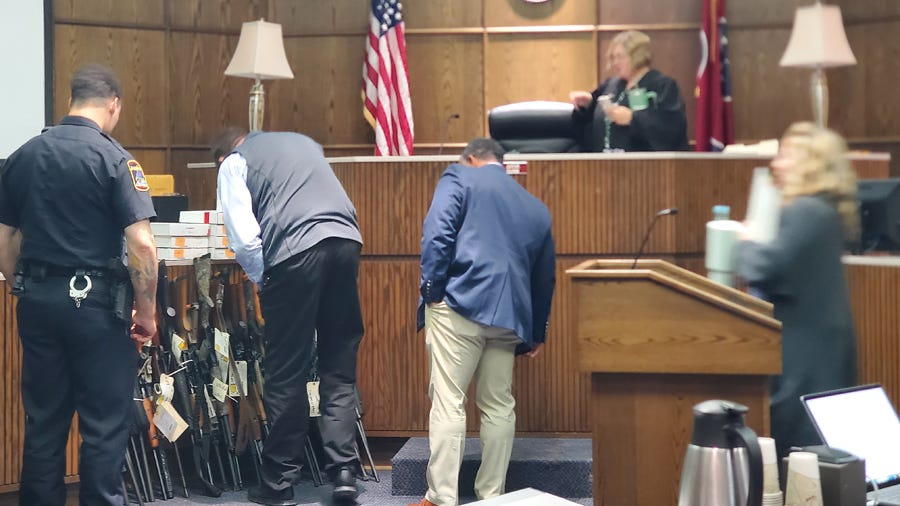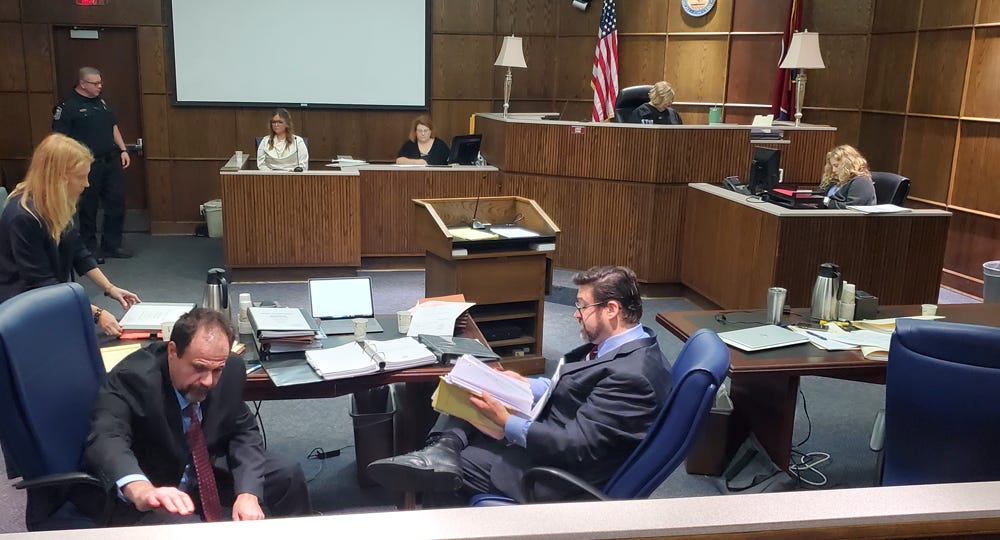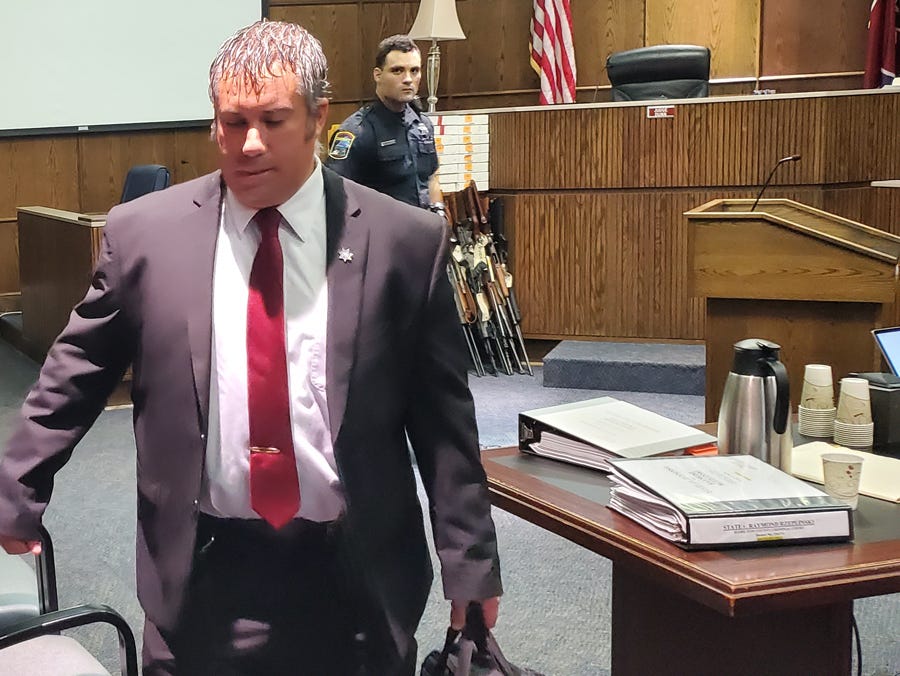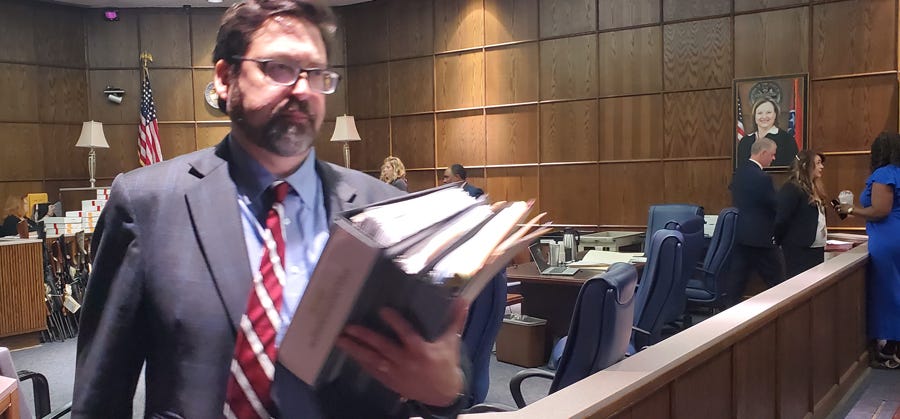State stacks seized guns, hides evidence, puffs smoke into 2A Ray jury’s eyes
Detective withholds evidence until first day of trial showing Rzeplinski bought many guns with TBI OK
CHATTANOOGA, Tenn.,Wednesday, July 31, 2024 – The Ray Rzeplinsky trial is a rolling violation of lawyer ethical rules laid down by the five justices of the Tennessee supreme court.



The second day of the trial hears from the former girlfriend of Mr. Rzeplinski’s son Curtis and from a criminal court clerk keeper of records in Bradley County.
The bureaucrat is sought to lay the groundwork of the record that the accused is supposed to have known about but didn’t. The other to give more dramatic footage about Aug. 16, 2019, the day of the Ray’s Plumbing owner’s arrest in a violent 20-deputy SWAT arrest that left a dark blood pool in a residential driveway.
A third witness, Hamilton County sheriff’s office detective Jason Maucere, gets the credit for uncovering Mr. Rzeplinski’s lost felony record to bring it to light for the first time in 24 years, for which error Mr. Rzeplinski is being held to account.
The supreme court’s directives are embodied in what lawyers know as, with rich redundancy, Rule 8 rules for professional conduct.
The facially degenerate case against gun investor and collector Mr. Rzeplinski violates its candor standards and lawyer duty to instill “confidence” in the courts and work for justice. The case has consumed private and public resources at a huge rate, almost as voluminously as it has revealed more of DA Coty Wamp’s slackardliness and belligerence.
Miss Wamp and her well-dressed ADAs Nicole Evans and Jeff Jones violate the demand for “dedication to justice and the public good.” The prosecution of “2A Ray” is supposed to exhibit “knowledge of the law, skill in applying the applicable law to the factual context, thoroughness of preparation, practical and prudential wisdom, ethical conduct and integrity.”
The prosecution rests midafternoon today, with these obligations seemingly unmet.
Their whole first day of a trial paid for by taxpayers in both prosecution and defense is a breach of these because they are putting on the stand witnesses who cannot help their case except to deceive the jury as to its real job and to complexify the case.
Laborious proof of guns’ existence
Mrs. Evans introduces into evidence each rifle, shotgun and pistol, one by one, with Detective Maucere giving the green light that each is seized from the Rzeplinski house on 1515 Crabtree Road in Hixson.
In this handoff of evidence from Mrs.Evans to Mr. Maucere, 55 times, they break the monotony by sharing chirpy, friendly expressions in making chit chat about the state property in custody — scopes, red-dot sights, collapsible stocks and receivers, lever actions. The detective has to explain the difference between automatic and semiautomatic. A long Uzi magazine seems to baffle Mrs. Evans.
Mr. Maucere is seated in the witness stand, and when she has repeated a formula of questions and statements, each firearm is stacked with its brothers against the judge’s dais.
The repetitiveness is intended to impress the jury with the particulars of facts of firearms. The fact of their existence and control are not disputed, and don’t have to be proven. Mr. McGowan, as the start of this bluffery, offers a “standing non-objection.” He states at one point that the issue is not muzzles, stocks and pistol grips, nor ownership. The issue is Ray’s knowledge of his legal status.
The demonstration fails to put the jury 9 millimeters closer to accomplishing its main job to convict — to be secure and to rest easy in the knowledge that the accused knew he was a felon and couldn’t legally own any of them under Americans’ felon gun ban.

Lead witness holds back evidence
Detective Jason Maucere, in his five year hard-on for Mr. Rzeplinski, holds until the first day of trial a vital piece of reliance evidence. He delivers it to Miss Wamp’s office, which immediately emails it to Mr. McGowan. It’s as many as 20pp of forms showing F$10 payments for Wal-Mart, Academy Sports and other retailer TBI background checks for sale of firearms. These forms show Mr. Rzeplinski gets state green light for gun purchases, affirming his lack of mens rea, or guilty mind.
Mr. Maucere testifies that earlier in the week of the day in which 2A Ray was arrested, “attention had been drawn to Mr. Rzeplinski” by the accused himself. A department secretary had gotten a call from him regarding crimes in his business — another instance of a “911 call from hell.” A deputy colleague, Robin Lankford, had asked Mr. Maucere to call Mr. Rzeplinski back. “I was looking into him as far as what had gone on,” the detective says, because when people call the Hamilton County sheriff's department property crimes unit, they get investigated themselves. Mr. Maucere does a review of “the subject” in the Tennessee integrated justice portal, and he says he saw a “red flag.”
"2A Ray" has a “TOMIS record,” or one in the Tennessee offender management information system. “I thought that was odd,” because Tomis indicated felony conviction in Bradley County in 1996. He says he “actually went to Bradley county to their courts; I went down there in person,” and went to clerks who confirmed a felony conviction.
By the time Detective Maucere “responded to the scene” Aug. 16, 2019, Mr. Maucere believed the plumber had been convicted of a felony. He says a wellness-check call came in to the department of one “threatening suicide or violence with a firearm,” as the bureaucracy puts it. Officers made in a “protective sweep of the house” (effectively a warrantless search) saw firearms.
Crucial qualification
The job of Miss Wamp, Mrs. Evans and Mr. Jones by indictment is to prove their victim is a felon with a crucial qualification – that he “intentionally, knowingly or recklessly” owned and controlled firearms. That is their task. It’s the second day of trial, and the trio are again distracting or wowing the jury.
It appears they realize they cannot pull off their case in making their case in chief, one that admittedly is impossible.
Tuesday’s witnesses bear testimony about the day in which Mr. Rzeplinski’s arrest in a confrontation made extraordinarily violent and menacing by the arrival of SWAT in the tendency of police and deputies to escalate to the point of violence on allegations that Mr. Rzeplinski is up and needs a wellness check. His son Curtis’ former girlfriend, Alexis Aaron, testifies she had no intention that calls to 911 end up in an arrest and bloody beating of an unarmed man. The call was for what’s known as a “wellness check” upon someone possibly intending to harm himself.
Today the jury hears testimony from the keeper of records in Bradley County criminal court. It appears the prosecution’s main point is to show that next to Mr. Rzeplinski’s “burglary” felony and petty theft judgments it says “file not found,” meaning that there is a file 2A Ray should’ve known about, because he signed a judgment document in 1995. The implication is that “file not found” is no excuse for Mr. Rzeplinski not remembering the fraught days in his early 20s with his “knucklehead” pals, as the lawyer calls them.
Bradley official Kari Ledford, state witness No. 6, provides certified copies of the felony judgment Oct. 11, 1996. Mr. Rzeplinski signed the form agreeing he won’t keep or transport firearms. She produces an election commission letter from Feb. 5, 1996, indicating he cannot vote as a felon.
Mrs. Ledford issues bewildering testimony, with confusion running through her words as to which clerk’s report is meaningful, her criminal court’s, or sessions’. There is a display of that document showing other "2A Ray" offenses alleged, not expunged. This showing other charges not in view in the trial is prejudicial to the accused – no objection from McGowan that it lowers the jury’s view of Mr. Rzeplinski’s character. The testimony was so confusing that Mr. McGowan had to ask the woman at the very end for which court she works.
Because they realize they have an almost impossible job, prosecutors figure they'll win the jury with an alternate theory of the case that has nothing to do with proving intent or discrediting all the evidence Mr. Rzeplinski has had in a record of government approvals of his purchasing firearms.
That is his defense, that any alleged or archive discovered proof of a felony conviction in 1995 is cured by repeated approvals of his purchase and possession of firearms by TBI, FBI, ATF and Tennessee department of safety and homeland security, which issues conceal carry permits.
The prosecution of Mr. Zeplinski is a civil rights violation prosecutable by him civilly under 42 U.S.C. § 1983, civil rights.
Ethical obligations
The district attorney’s office rejects the admonition to be “guided by personal conscience” and to “exemplify the legal profession's ideals of public service.”
The definition of lawyer fraud is “intentionally false or misleading statement of material fact, an intentional omission from a statement of fact” intended to “deceive a person or tribunal,” the rules say.
The rules maintain a specious pretense that the profession isn’t already entirely owned by the state under privilege, but that somehow the lawyer cartel operates independently for justice and the public welfare.
The occasion for government regulation is obviated. Self-regulation also helps maintain the legal profession's independence from government domination. An independent legal profession is an important force in preserving government under law, for abuse of legal authority is more readily challenged by a profession whose members are not dependent on government for the right to practice.
RULES OF PROFESSIONAL CONDUCT, preamble at 12.
Lawyers’ Rule 3.3 on candor toward the tribunal strikes at the heart of bogus prosecutions. The Wamp team did “fail to disclose to the tribunal legal authority in the controlling jurisdiction known to the lawyer to be directly adverse to the position of the client and not disclosed by opposing counsel” (a)(2).
Miss Wamp knew before soliciting indictment that Mr. Rzeplinski had been cured of his felony by the state itself. She should have called 2A Ray, advised him the state was giving him two days or 30 days to remove all weapons from his control, allowing him to sell them under the hand of another. He could then have commenced living his life knowing himself of record to being a felon. Such treatment would admit the state’s numerous errors in the record, its misleading and entrapping him, and accept that Mr. Rzeplinski had committed no crime.
Observes Levi Thurston, one of my gnomes, a Tennessee man working as a field hand in Mertens, Texas. “It's obvious the state literally buried these records and definitely concealed this from the state and federal authorities on their numerous requests and approval processes which are definite, directed and bright lines of questions. This is repeated fraudulent concealment from all parties involved and amounts to entrapment of the defendant.”
He adds, “If you have approval from anybody who can review the findings of a court, and they all come to the conclusion that [Mr. Rzeplinski] did also, that this is a misdemeanor, then they tell everybody, ‘Oh, ya’ll were wrong for 24 years, it’s because this guy — he’s the one they’re gonna prosecute, and not the fact that ya’ll went ahead and fraudulently engaged in this approval process that has gone on, a fraudulent concealment.”
To Amanda Dunn’s strong credit, the judge allows Mr. Rzeplinski to make a second on-the-record allocution or statement of grievance about the proceedings, expressing his concern that neither court nor Mr. McGowan are protecting his due process rights. Other judges would have absolutely denied the enjoyment of this constitutionally guaranteed right, pinched down into a dust speck by the lawyer guild.



